Health care and epidemics





1 слайд
1 слайд
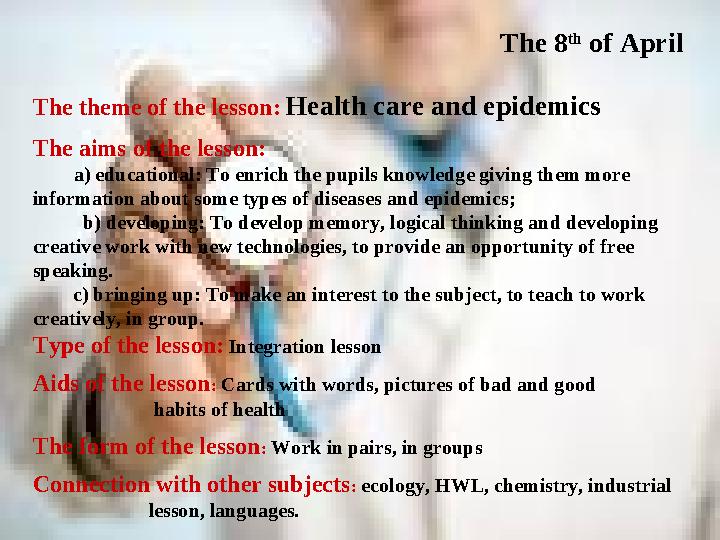
2 слайд
The 8 th
of April
The theme of the lesson: Health care and epidemics
The aims of the lesson:
a) educational: To enrich the pupils knowledge giving them more
information about some types of diseases and epidemics;
b) developing: To develop memory, logical thinking and developing
creative work with new technologies, to provide an opportunity of free
speaking.
c) bringing up: To make an interest to the subject, to teach to work
creatively, in group.
Type of the lesson: Integration lesson
Aids of the lesson : Cards with words, pictures of bad and good
habits of health
The form of the lesson : Work in pairs, in groups
Connection with other subjects : ecology, HWL, chemistry, industrial
lesson, languages.
2 слайд
The 8 th of April The theme of the lesson: Health care and epidemics The aims of the lesson: a) educational: To enrich the pupils knowledge giving them more information about some types of diseases and epidemics; b) developing: To develop memory, logical thinking and developing creative work with new technologies, to provide an opportunity of free speaking. c) bringing up: To make an interest to the subject, to teach to work creatively, in group. Type of the lesson: Integration lesson Aids of the lesson : Cards with words, pictures of bad and good habits of health The form of the lesson : Work in pairs, in groups Connection with other subjects : ecology, HWL, chemistry, industrial lesson, languages.

3 слайд
1.English equivalent of “ здоровье
2.What’s the English for “ операция “ ?
3 .What’s the English for “ хирург “ ?
6.English equivalent of “ медицина ”
7.What is it “ наука ” ?
8.Synonym of “ill”
9.What’s the English for “ боль ”?
3 слайд
1.English equivalent of “ здоровье 2.What’s the English for “ операция “ ? 3 .What’s the English for “ хирург “ ? 6.English equivalent of “ медицина ” 7.What is it “ наука ” ? 8.Synonym of “ill” 9.What’s the English for “ боль ”?
![Amount [ ә ’maunt], n – мөлшері, саны Cure [kju ә ] – емдеу Contagious [k ә n’teidj ә s], adj – жұғатын, жұқпалы Cough [kof] Amount [ ә ’maunt], n – мөлшері, саны Cure [kju ә ] – емдеу Contagious [k ә n’teidj ә s], adj – жұғатын, жұқпалы Cough [kof]](https://api.ust.kz/storage/files/materials/ppt/image/2020/april/d29/1588129133-4.jpeg)
4 слайд
Amount [ ә ’maunt], n – мөлшері, саны
Cure [kju ә ] – емдеу
Contagious [k ә n’teidj ә s], adj – жұғатын, жұқпалы
Cough [kof], n – жөтел
Epidemics [epi’demik], n – эпидемия
Fever [‘fi:v ә ], n - дене қызуы, безгек
Influenza [,influ’enz ә ], n – тымау, грипп
Inject [in’djekt], v – дәрі жіберу
Prevent [pri’vent], v – сақтап қалу, қорғау
Relieve [ri’li:v] - жеңілдету
Separate [‘sep ә ,reit] - бөлу, айырып жіберу
Sneeze [sni:z] - түшкіру
Spread [spred], v – жаю, тарату
4 слайд
Amount [ ә ’maunt], n – мөлшері, саны Cure [kju ә ] – емдеу Contagious [k ә n’teidj ә s], adj – жұғатын, жұқпалы Cough [kof], n – жөтел Epidemics [epi’demik], n – эпидемия Fever [‘fi:v ә ], n - дене қызуы, безгек Influenza [,influ’enz ә ], n – тымау, грипп Inject [in’djekt], v – дәрі жіберу Prevent [pri’vent], v – сақтап қалу, қорғау Relieve [ri’li:v] - жеңілдету Separate [‘sep ә ,reit] - бөлу, айырып жіберу Sneeze [sni:z] - түшкіру Spread [spred], v – жаю, тарату

5 слайд
5 слайд
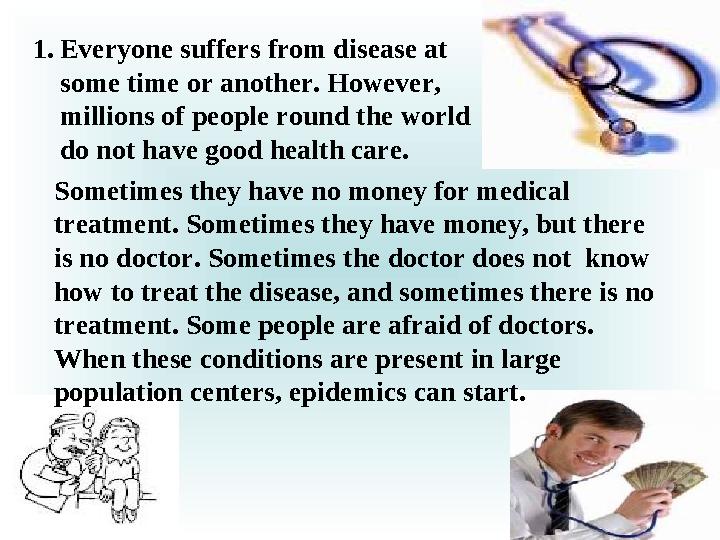
6 слайд
1. Everyone suffers from disease at
some time or another. However,
millions of people round the world
do not have good health care.
Sometimes they have no money for medical
treatment. Sometimes they have money, but there
is no doctor. Sometimes the doctor does not know
how to treat the disease, and sometimes there is no
treatment. Some people are afraid of doctors.
When these conditions are present in large
population centers, epidemics can start.
6 слайд
1. Everyone suffers from disease at some time or another. However, millions of people round the world do not have good health care. Sometimes they have no money for medical treatment. Sometimes they have money, but there is no doctor. Sometimes the doctor does not know how to treat the disease, and sometimes there is no treatment. Some people are afraid of doctors. When these conditions are present in large population centers, epidemics can start.
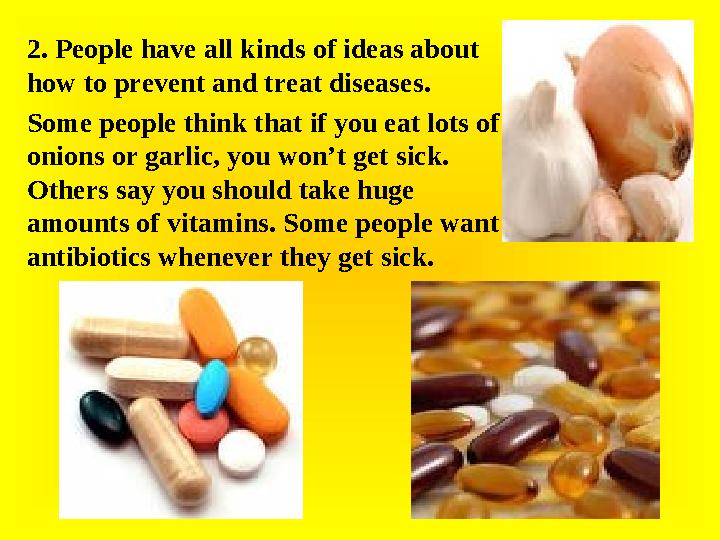
7 слайд
2. People have all kinds of ideas about
how to prevent and treat diseases.
Some people think that if you eat lots of
onions or garlic, you won’t get sick.
Others say you should take huge
amounts of vitamins. Some people want
antibiotics whenever they get sick.
7 слайд
2. People have all kinds of ideas about how to prevent and treat diseases. Some people think that if you eat lots of onions or garlic, you won’t get sick. Others say you should take huge amounts of vitamins. Some people want antibiotics whenever they get sick.
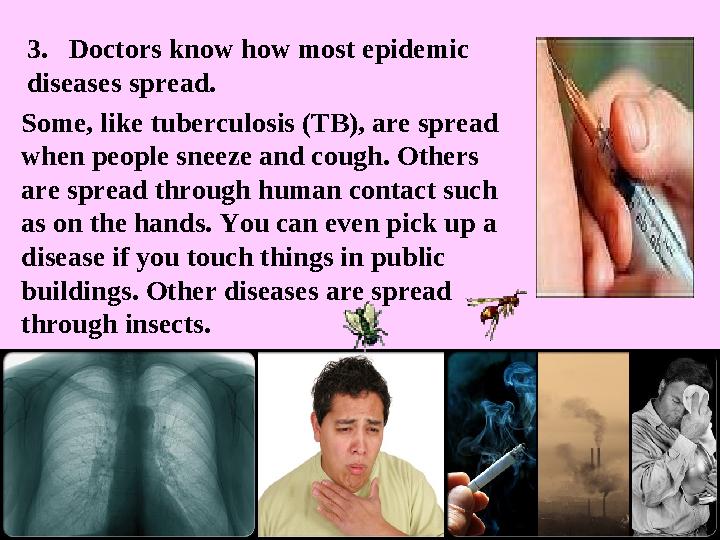
8 слайд
3. Doctors know how most epidemic
diseases spread.
Some, like tuberculosis (TB), are spread
when people sneeze and cough. Others
are spread through human contact such
as on the hands. You can even pick up a
disease if you touch things in public
buildings. Other diseases are spread
through insects.
8 слайд
3. Doctors know how most epidemic diseases spread. Some, like tuberculosis (TB), are spread when people sneeze and cough. Others are spread through human contact such as on the hands. You can even pick up a disease if you touch things in public buildings. Other diseases are spread through insects.
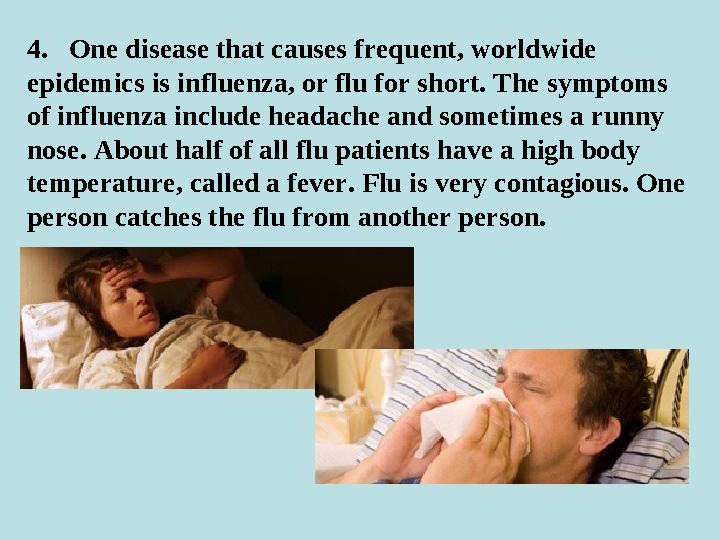
9 слайд
4. One disease that causes frequent, worldwide
epidemics is influenza, or flu for short. The symptoms
of influenza include headache and sometimes a runny
nose. About half of all flu patients have a high body
temperature, called a fever. Flu is very contagious. One
person catches the flu from another person.
9 слайд
4. One disease that causes frequent, worldwide epidemics is influenza, or flu for short. The symptoms of influenza include headache and sometimes a runny nose. About half of all flu patients have a high body temperature, called a fever. Flu is very contagious. One person catches the flu from another person.
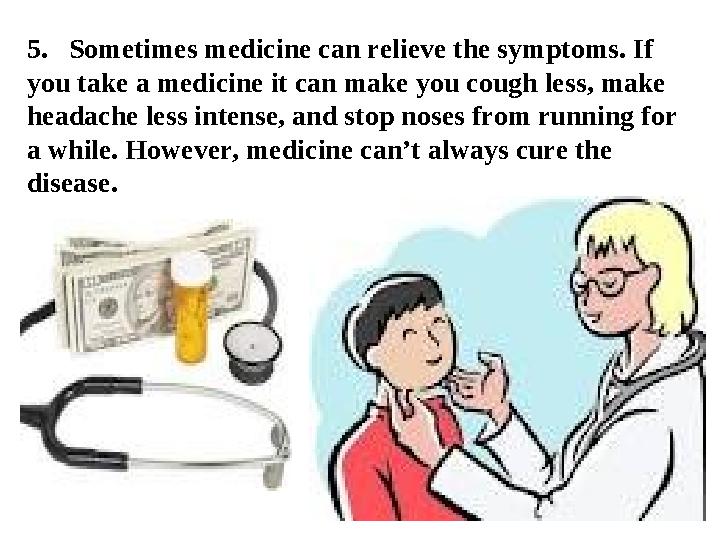
10 слайд
5. Sometimes medicine can relieve the symptoms. If
you take a medicine it can make you cough less, make
headache less intense, and stop noses from running for
a while. However, medicine can’t always cure the
disease.
10 слайд
5. Sometimes medicine can relieve the symptoms. If you take a medicine it can make you cough less, make headache less intense, and stop noses from running for a while. However, medicine can’t always cure the disease.
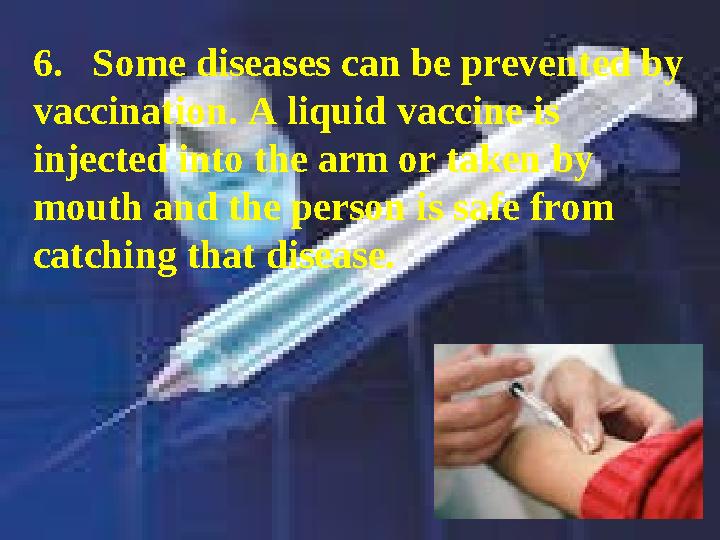
11 слайд
6. Some diseases can be prevented by
vaccination. A liquid vaccine is
injected into the arm or taken by
mouth and the person is safe from
catching that disease.
11 слайд
6. Some diseases can be prevented by vaccination. A liquid vaccine is injected into the arm or taken by mouth and the person is safe from catching that disease.
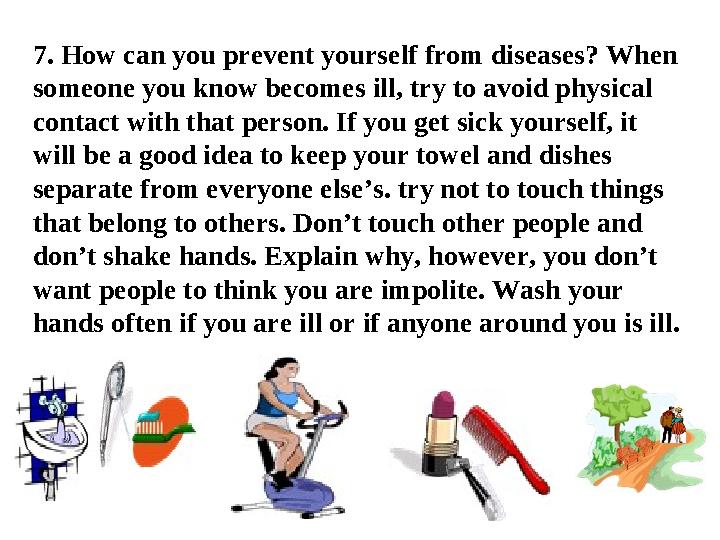
12 слайд
7. How can you prevent yourself from diseases? When
someone you know becomes ill, try to avoid physical
contact with that person. If you get sick yourself, it
will be a good idea to keep your towel and dishes
separate from everyone else’s. try not to touch things
that belong to others. Don’t touch other people and
don’t shake hands. Explain why, however, you don’t
want people to think you are impolite. Wash your
hands often if you are ill or if anyone around you is ill.
12 слайд
7. How can you prevent yourself from diseases? When someone you know becomes ill, try to avoid physical contact with that person. If you get sick yourself, it will be a good idea to keep your towel and dishes separate from everyone else’s. try not to touch things that belong to others. Don’t touch other people and don’t shake hands. Explain why, however, you don’t want people to think you are impolite. Wash your hands often if you are ill or if anyone around you is ill.
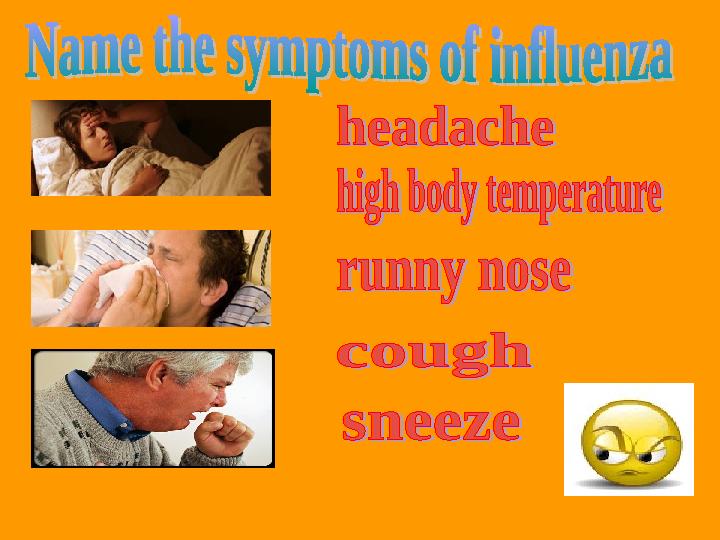
13 слайд
13 слайд
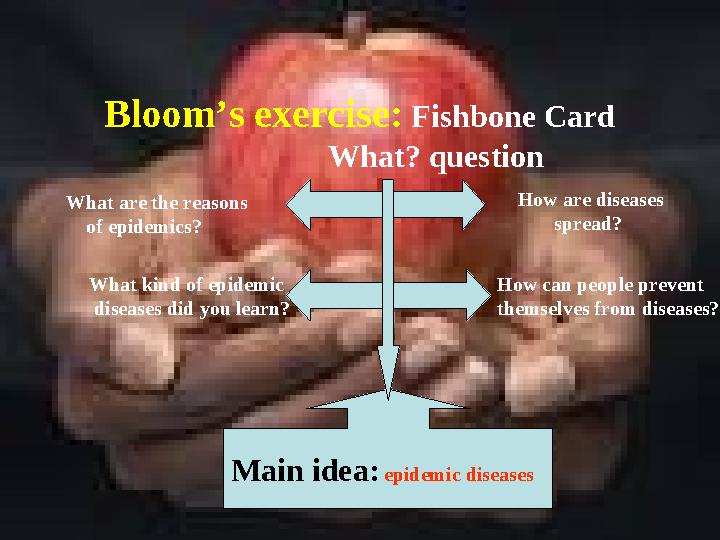
14 слайд
Bloom’s exercise: Fishbone Card
What? question
Main idea: epidemic diseases How are diseases
spread? What are the reasons
of epidemics?
How can people prevent
themselves from diseases?What kind of epidemic
diseases did you learn?
14 слайд
Bloom’s exercise: Fishbone Card What? question Main idea: epidemic diseases How are diseases spread? What are the reasons of epidemics? How can people prevent themselves from diseases?What kind of epidemic diseases did you learn?
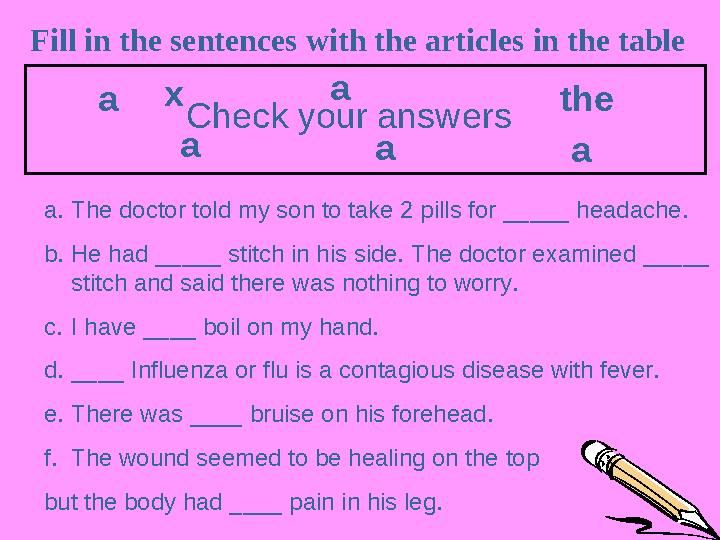
15 слайд
Fill in the sentences with the articles in the table
С heck your answersa
a thea
a
aх
a. The doctor told my son to take 2 pills for _____ headache .
b. He had _____ stitch in his side. The doctor examined _____
stitch and said there was nothing to worry.
c. I have ____ boil on my hand.
d. ____ Influenza or flu is a contagious disease with fever.
e. There was ____ bruise on his forehead.
f. The wound seemed to be healing on the top
but the body had ____ pain in his leg.
15 слайд
Fill in the sentences with the articles in the table С heck your answersa a thea a aх a. The doctor told my son to take 2 pills for _____ headache . b. He had _____ stitch in his side. The doctor examined _____ stitch and said there was nothing to worry. c. I have ____ boil on my hand. d. ____ Influenza or flu is a contagious disease with fever. e. There was ____ bruise on his forehead. f. The wound seemed to be healing on the top but the body had ____ pain in his leg.
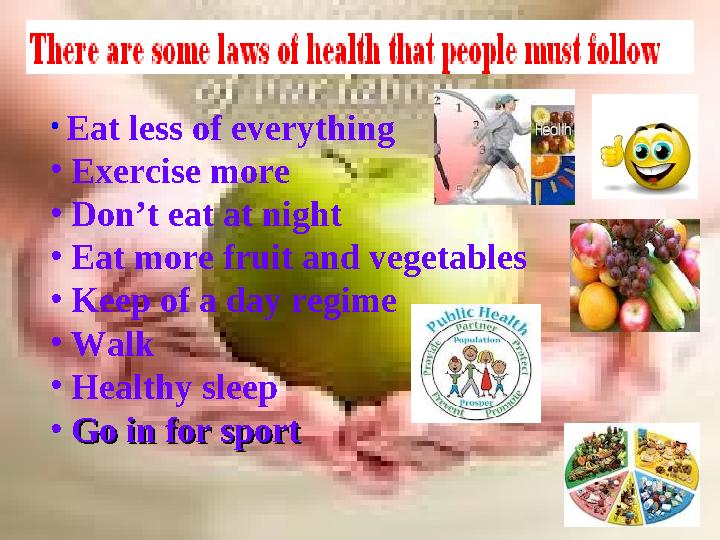
16 слайд
•
Eat less of everything
•
Exercise more
•
Don’t eat at night
•
Eat more fruit and vegetables
•
Keep of a day regime
•
Walk
•
Healthy sleep
•
Go in for sportGo in for sport
16 слайд
• Eat less of everything • Exercise more • Don’t eat at night • Eat more fruit and vegetables • Keep of a day regime • Walk • Healthy sleep • Go in for sportGo in for sport















